Sponsored by Battle Quest Comics
By Brian Hibbs
Last month my store Comix Experience celebrated it’s 33 & 1/3rd anniversary (“we’re still spinning” was our tagline for those who remember phonographs, ha), which means I’ve been selling comics in my own store for a third of a century, yikes.
Besides the fact that makes my store more tenured than anyone in senior management at Marvel or DC – and older in total than publishers like Image comics or Boom! – that also makes me in this business long enough to remember just how horrible things could be. As a good “for example”, I vividly remember that when we started while we had at least a dozen wholesalers we could buy graphic novels from (though really only four properly viable choices in the San Francisco Bay Area), actually finding which one had something as core as, say, “Watchmen” in stock any given week was always a giant crap shoot. One week Capital City would have it, the next they wouldn’t, a different week Diamond would have it, and the third they wouldn’t, and so on. It made the very act of restocking your store to be a very complex and ever-changing process each time, that did nothing to actually sell more comics for those extra costs in time and effort.
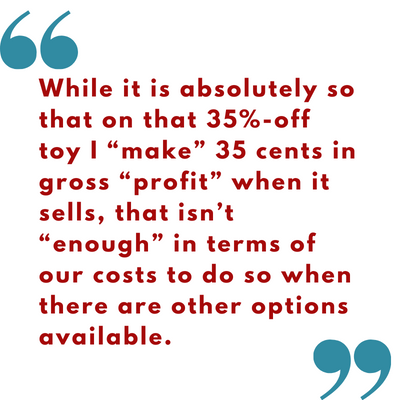
(I do have to note that Ryan didn’t @ me on Twitter, so I didn’t even see it until David Harper flagged it weeks later – not that I would have done much there since I find the 280 character limit at Twitter to be nearly useless in discussing things with any level of nuance – though I did answer him in a private retailer’s group on Facebook; and for whatever reason my Google alerts for my name and the name of the store didn’t tell me about Harper’s piece [paywall, maybe?], and I would never have seen it without Heidi telling me)
So, since I was directly asked to address these concerns by my Editor, let’s try and tackle things head on, starting with the Twitter bit. Ryan said “I’ve seen some variation of this topic for months from Brian, and the math just doesn’t work. How does a 50% (or 46.8%) discount make you not even break even on the sale? You sell the comic, you make 46.8% profit. I don’t understand the math.”
So, I can’t speak for anyone else about what tools they use to evaluate their business, but what I have always done is gather my costs and look backwards at what kind of wholesale pricing I need to pay for those costs. The rest is the potential for “profit”. This is not precision math because, of course full costs can usually only be properly assessed after the fact, but it gives me a set of benchmarks to determine what’s “worth” carrying, and in what manner. I started doing this in like ’94 or something as I was trying to figure what all of those toys that were sitting around unsold were doing, and I realized back then that anything I wasn’t getting around 35% off on (a pretty typical wholesale toy margin) wasn’t then providing a meaningful amount of profit as a return on the investment being made when it eventually sold. If it eventually sold. It cost me, back then, something on the order of 34 cents to generate $1 worth of sales, so anything that’s only making me 35 cents on a dollar-of-sales is just barely breaking even, or losing me a small amount. I almost entirely stopped ordering toys after that as a result of this revelation, because I concluded I could make more (or, “any”) profit selling other goods in the same space.
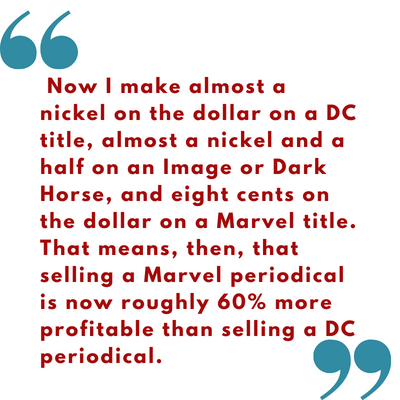
Just to be painstakingly clear: that’s not even remotely the sole metric I look at when I make a decision to carry or not to carry a product, of course – there’s plenty of things we stock that I know are essentially break-even propositions because I think they’re strong example of comics making, because I like the creator, because there’s an audience for a thing that if I serve it those customers might buy more profitable items (or even lose that customer entirely for not having the thing they want), etc etc ad infinitum. But at least considering the Return on Investment is a pretty normal thing to do in business forecasting, at least as I understand it.
To put it in more tangible terms, my current costs these days thanks to the expenses of being in the City in which I live, as well as the ways the economic scale has become weighed against comics retailers the last two or so years, is that it now costs me closer to 42 cents of costs to make a dollar of sales in 2022. Therefore things bought at a 45% or lower discount are essentially a wash (or worse) in terms of making an individual profit on an individual item. YES, I have “made” 45 cents of cash flow, but my actual profit is down to like three cents on-a-dollar, when it was more like seven cents in 1994 (or whatever the exact year I started thinking of things this way was).
Before DC pulled out of the single periodical distributor model (in April of 2020), my Marvel, DC, Dark Horse and Image effective discount (base discount minus the shipping costs) was roughly 52% for periodical comics. As of July 1st my business is looking at 46.8% for DC (from Lunar), 47.2% from Image and Dark Horse (from Diamond), and 50% from Marvel (from PRH) for the periodicals. Now I make almost a nickel on the dollar on a DC title, almost a nickel and a half on an Image or Dark Horse, and eight cents on the dollar on a Marvel title. That means, then, that selling a Marvel periodical is now roughly 60% more profitable than selling a DC periodical.
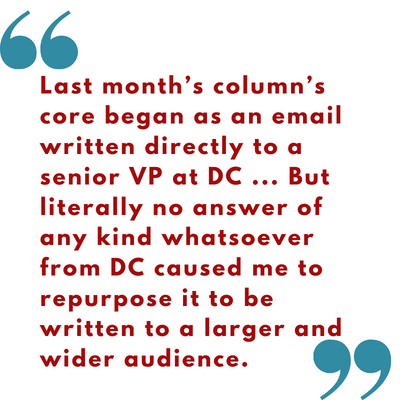
This is, sadly, just as true as buying almost anything that is solely available from Diamond (which includes virtually all periodicals not published by Marvel, DC or IDW, and graphic novels and periodicals from Image or Dynamite since they have exclusive arrangements currently). And it is my philosophy that all “rack” copies are ultimately discretionary dollars: Probably the single biggest lesson the pandemic taught me is that I’m more profitable in selling out of 90% of periodicals the first weekend than I was keeping them on the racks hoping that non-subscribers would buy them. Those purchasing dollars are much better off being redistributed towards less perishable formats, especially given the new pricing differentials between periodicals and perennials that DC’s abandonment of the Diamond system inadvertently created.
So… That’s my math. I hope it is more understandable now?
(Imagine trying to say that on Twitter?)
In terms of the column from David Harper, it’s hard to know what to say other than I think that perhaps some of the seeming confusion is stemming from some misunderstanding of both motivation and positioning. This is almost certainly my own fault for being less of a writer than lives in my own head, but as a top level thing, I don’t think that at any point in last month’s column (which was, I thought, clearly a continuation of the one before that? And, is part of a running series of columns for a good long while now?) I was not explicitly clear that when I was discussing specific maths that I was solely referring to my own circumstances? Mostly because when we’re looking at final discounts in terms of the relationship to shipping costs those are pretty purely individual situations based on distance-from-warehouse?
Either way, I think it’s possibly worth making a few specific points here, the first of which is: none of my commentary was actually directed at Lunar itself whatsoever. I don’t believe that Lunar is an especially “real” distributor – I think they’re a consumer-oriented fulfillment company (terrifically difficult to call them a “retailer”, if you ask me) that DC has tried to scale up to handle wholesale, and I don’t believe they have any real control over what happens with DC products (the quotes from Merkler in Harper’s piece would seem to bear that out, too!). They don’t have a handle on basic data practices like series codes, they do bizarre things like entirely removing sold out books from their databases, they don’t have a way to speak to a human, and so on and so forth.
So, here is a “secret” about writing a column like this with nearly three hundred entries: a significant percentage I write actually starts life as something else. In this case, last month’s column’s core began as an email written directly to a senior VP at DC, and that’s a VP who indicated that they directly wanted to hear from me on issues like this by the way. But literally no answer of any kind whatsoever from DC caused me to repurpose it to be written to a larger and wider audience.
I don’t care about Lunar, or trying to change “their” minds. That would, I think, be pretty pointless for how I understand how things work. No, my column was actually entirely directly at DC, because airing things in public has a generally OK track record. It doesn’t necessarily change things on the spot (the column is titled “Tilting at Windmills”, after all!), but it exposes flaws to a wider number of people than an email might, in my experience. I think that setting up rules that can cause DC’s discount on their corest of core products (the serialization, since it is that serialization that funds and makes possible the perennial book format product) to be the lowest of any of the major comic providers, for some number of retailers, is prima facie a bad policy that will only hurt DC. Speaking for myself, I’m not motivated to spend more dollars on DC periodicals in this scenario – especially from a middleman company that clearly doesn’t have my best interests at heart
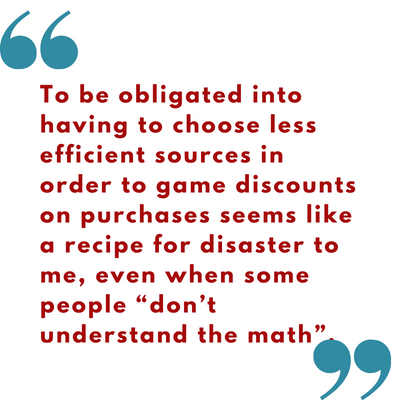
I strongly believe that publishers should have the best interest of stores that act as their showrooms at the very center of every way they act because it is those stores which hold the possibility of expanding the audience for specific goods by acting as those showrooms! I think that, nearly by definition, a discount vendor who only can sell things via a catalog is essentially incapable of expanding the audience or to exposing people to material they are not already inclined to purchase.
I further believe that because of the way in which DC upended how distribution works (for everyone!), they have an even greater responsibility to figure out how to appropriately reward retailers for doing business with them. While it may be true that the “average” comic shop primarily exists to sell the velvet trap of DC and Marvel periodicals, I think that the smartest retailer is the one who sells based on art and expression within the medium itself – I have no “loyalty” to DC, past the point where they are publishing “the best comics”. If they stop producing “the best comics”, I have hundreds and hundreds and hundreds of other choices to put on my shelf in its place. This is why volume-driven discounts modeled on market understandings built around a centralized distributor (where there was literally no where else to buy periodical comics than Diamond) just don’t make sense when you destroy that centralized market. Harper says “That’s an understandable complaint, albeit one with no easy solution given how distribution has divided”, which makes little sense to me – I’m not especially wise or smart, and I can think of multiple ways to solve that problem, the lowest-hanging fruit way is what Penguin Random House does which is “Here’s the same discount for all comers that allows you to at least keystone goods all the time”
Do I think that’s enough? Oh hells no. I think that should be the minimum floor that any brick and mortar retailer should be earning just from having a B&M location vending these goods. I then believe that any store doing more than the barest minimum (having an account) should be able to trivially earn significantly higher discounts so there’s actually an incentive to grow those vendor’s business. Look: I’m in business to make money for my store, for my staff. I have no incentive to make money for DC, unless they give me a specific one to consider. DC is aware of what my volume is between all suppliers they use (or, I should say, DC has the ability to pay attention to that, should they choose to do so) – and if there was a reason or a point to my last column it was exactly that: DC has set things up in a manner designed to make me fail, if I am not interested in funding a direct retail competitor.
(We’re still waiting for a lot more information on pricing and shipping costs and other things to see if DC’s newest distributor, Universal [who doesn’t compete with us at retail!] will be equally competitive to Lunar. From public information so far, this is far from a certainty. But I hold out hope!)
To try and tie this back to the opening paragraphs, it doesn’t really matter if it is “Lunar” or “DC” is the reason that I can’t consistently get [product x] from Lunar when PRH has it in stock, what matters is that I shouldn’t be asked to buy it from the “inferior” source because that creates wild inefficiencies in the work of stocking and restocking books. In 1989, I could always eventually find whatever backlist I wanted from someone, somewhere, but there’s a real world cost to having to use multiple sources to stock core product. It is meaningfully more efficient to buy the majority of my backlist from one source: having to place different orders in different ways, to receive and unpack different orders at different ways does nothing but cost time or money. To be obligated into having to choose less efficient sources in order to game discounts on purchases seems like a recipe for disaster to me, even when some people “don’t understand the math”.
Either way, at the end of the day one thing seems certain to this observer: overall, the ultimate discount against printed cover price that most retailers are receiving on periodicals and graphic novels as a whole has significantly declined over the last three years; and because of the “chancy” nature of the periodical, and the shorter windows to sell them (roughly: periodical comics are like milk, while graphic novels are like cheese), the risk/reward on the periodical has accelerated dramatically. In the private Facebook discussion groups a greater and greater number of retailers are talking about “getting out of” new comics, or of retiring early, or of closing their stores entirely. While some retailers are ecstatic about option x, and harmed by option y, and others are reversed in those positions, I don’t think there’s any question that for most retailers pricing and ROI has gotten meaningfully worse on the category overall, and that costs are escalating to squeeze those profits further. This, then, is a direct danger to the Direct Market as we know it, even if one aspect or another doesn’t impact all participants equally.
**************************
Brian Hibbs has owned and operated Comix Experience in San Francisco since 1989, was a founding member of the Board of Directors of ComicsPRO, has sat on the Board of the Comic Book Legal Defense Fund, and has been an Eisner Award judge. Feel free to e-mail him with any comments. You can purchase two collections of the first Tilting at Windmills (originally serialized in Comics Retailer magazine) published by IDW Publishing, as well as find an archive of pre-CBR installments right here. Brian is also available to consult for your publishing or retailing program.
Sponsored by Battle Quest Comics



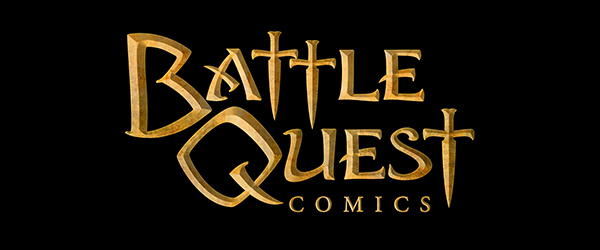







I hate to say this Brian , but you are starting to sound like the “Old Man” , who states “If the ball comes in my yard , I am keeping it”. Seriously , I am one of aprx 25 stores in a 30 mile radius. None of us, could make any sense of your rant. You seem very bitter, and I am guessing there is more to this story , then we are receiving, Seriously , if you can not make the 55% level at Lunar, you are not trying.
I guess I’m still confused why Brian is wrong/insane/crazy/bitter/whatever and all these folks need to scream at Heidi about how wrong he is. Rents are going up (along with everything else). Margins on the books one sells are slimmer. Because of all the changes to systems, it takes more time and effort to order books than it used to. Add in online stores (like Lunar, sorry, DCBS, Amazon, etc) who offer massive discounts to steal business from brick and mortar stores.
Seriously, as a guy who does not work in comics, but reads them (and lives in the real world), I don’t know how you managed before, Brian. And I’m amazed you got through the pandemic. And I’m sure it’s harder now. (Which I say with certainty because you’re far from alone there).
I think it might be time for Brian to give up and try his hand at something else. Blaming everyone else for his business issues seems very shortsighted, especially in a customer facing business. Maybe try something else. Adjust your business to focus on what’s selling and What isn’t. You are cutting off your nose to spite your face, and if you keep this up, you’ll be closing the doors while still blaming DC for everything
“Adjust your business to focus on what’s selling and What isn’t.”
I generally would advise people posting on the internet have the slightest idea what they’re taking about, though it IS the internet.
If we DIDN’T do this, we wouldn’t stay open for a year, let alone a third of a century, sheesh.
-B
Brian, you said in this, “ Harper says there is “zero evidence” that DCBS is a competitor to existing storefront retailers.” That isn’t remotely what I said. I said, and I actually quote, “it’s also worth noting that there has been zero evidence that this has affected Lunar’s performance at all.”
If you’re going to respond to an article, maybe actually try responding to what was actually written and not…whatever in the world this is.
Brian, I am also in the business but good for you for reacting to the comment and proving my point. Keep blaming everyone else. See how long it takes before people stop shopping at your store, you Angry Old Man
David, Well, I’m genuinely now not at all clear what you’re trying to suggest? Guess I know as little about how to read as I do to write! If your suggestion is that Lunar’s business isn’t impacted by their conflict of interest, I think I have to ask you, with all sincerity, “how on earth could you or anyone other than DC assert that?”
Dig it that while Lunar started “distributing” DC comics in 4/20, they didn’t become the “sole” distro of DC periodicals until 1/21 — there is, therefore, not even a single full fiscal year of year-over-year data to compare with. Also, not a scrap of that data is publicly available, so even if someone asserted it to you off the record, I’m not sure it is trustworthy in terms of the product offered. What do I mean? Well, with JAN21 codes, DC appears to have offered 37 distinct periodicals (with an average of 3.14 covers each) Last month’s SEP22 codes gives us 85 distinct periodical SKUs (with an average of 3.61 covers each) — if DC’s (Not “Lunar’s”) volume didn’t go up significantly with that change, that would be the ACTUAL story. In my Humble Opinion.
(Also DC has radically scaled up Returnabilty in this period, which conceptually has a meaningful impact on initial order volume… else they likely wouldn’t do it)
I infer that DC kind of has to understand that they have some level of potential issue amongst retailers, if only because they are going to add Universal, who is going to have to make a serious and meaningful investment via NEW warehouses on THIS side of the border. And I infer then from this that there are a meaningful number of retailers who either have been cut off from Lunar, or whom refuse to do business with them (or, like me, who have enough issues that we will change over if it is rational and viable to do so). I know a good number of these folks — I see them, I hear them on private retailer Facebook groups. The fact that I can easily name actual 35 stores with visible complaints who DO NOT do biz with Lunar (1% of last-known “# of stores” pre-pandemic) when Facebook is a shitty-ass platform with weak penetration makes me think the problem is a whole lot wider.
But we’ll see over [time period] what actually happens.
Either way: I don’t give two wet shits about a middleman’s performance, only how that directly impacts my class of trade..
MM, and since I’m already posting and it doesn’t deserve it’s own post, for “Booster Silver”: I will continue to give you as much credence as I would of any anonymous coward on the internet who leads with personal attacks, even if you’re also “in the business” (a remarkably wide assertion!)
-B
Brian, I’m not even debating all of that. I’m just requesting you don’t completely misrepresent what I wrote in your writing. You said: “Harper says there is ‘zero evidence’ that DCBS is a competitor to existing storefront retailers.”
What I actually said in the “zero evidence” paragraph is in full: “That beef is even understandable to a degree. By their very nature of selling the same product, DCBS and In-Stock Trades compete with comic shops for the same customers — just like any other comic shop does. That said, while that idea adds up in theory, it’s also worth noting that there has been zero evidence that this has affected Lunar’s performance at all. One retailer who dislikes DCBS even begrudgingly admitted to me that they are the strongest distribution partner shops have today.”
In the same paragraph where you extracted the “zero evidence” line, I say that DCBS is a competitor. So…the opposite of what you quoted me as saying. Again, my request is to not misrepresent what I’m saying. That’s all.
Additionally: It’s abundantly clear that I’m not talking business when I said also being DCBS has not affected Lunar’s performance. I’m talking about the actual act of distribution to comic shops. You’re arguing with points that aren’t even made in the article.
No surprise, you continue to angry comment and rage out like the angry man yelling at clouds. All of the reviews for your store have the same negative thing to say about a surly staff and the way you talk in your posts and comments it’s obvious to see that maybe the problem is you. Good for you being in business over 30 years but you have only yourself to blame for any shortcomings with your business. If you spend all of your time telling the world how angry you are and acting like this, why would anyone want to give you any money? Have you thought about longer hours? Less staff? Maybe the real issue with the money coming in and going out is you’re yelling about prices and shipping costs and blaming others, never once accepting any blame for your missteps.
And a question for you since you’re so angry about shipping costs and price increases, do you charge shipping when you send stuff to people via your store website? And why is it okay for you to charge shipping but no one else?
David, as I said, I apparently read as poorly as I write, but I for sure didn’t conclude from that you were addressing the physical ability of Lunar to distribute comics.
Mostly because I didn’t say or suggest absolutely anything about Lunar’s physical action whatsoever — it seems like a swerve from the content of the piece? Lunar is perfectly adequate, their damage rates are in line with DCD or PRH (under 0.5%, overall) — but one would expect nothing less considering they’re “distributing” likely well under 10% of what DCD does, and under 1% of PRH (all numbers pulled from my ass, not actual math)
They DO kinda suck with a lot of back end things [like, say, what they do with fractional pennies in discount and billing calculations, their utter distrust of all retailers (shown via the details of things like their return policies), their complete and utter lack of any way to speak to a human voice-to-voice, their erasure of data from the database once they sell out of a product, and a dozen other small things — but the “can they put comics in a box and get them here undamaged?”, I don’t know ANY retailer who thinks they don’t do that just fine.
-B
I want all comic retailers to thrive and succeed. I also think Brian Hibbs has done much for creating awareness of the flawed distribution process and what retailers go through. By the same token, the oft cruel reality of dream jobs is that we are not entitled to success even when we sacrifice our time and health. I remember an exchange between us a year or two ago where I was somewhat taken aback with your justification that comic retailers give up everything simply because they want to sell comics for a living, even if it’s not realistic. I’m paraphrasing only slightly, this is what you said- and you seemed taken aback when I asked you why that entitles you to success?
A business plan is one thing, but the infrastructure and system you’re working with is flawed and corrupt and this column illustrates to us, the comics reader, the struggles many retailers go through but writing this column won’t change the infrastructure. In all seriousness, I can’t remember many if any entries in this column where it’s seemed positive or joyous.. and I think that might say a lot- it might be time to put yourself first and stop chasing a dream. Ideally, it’d work because you’re really good at this. But ideally never happens because you can’t change or affect a bad marketplace and foundation.
I mean, “Heather”, the name of the damn column is “Tilting at Windmills”, not “Smiling at the Sunshine”. The sole point of writing TaW for the last THREE DECADES is to attempt to expose ill practices, and to try and make things better. And I believe that I have done more to repair stuff and to advocate for my class of business than nearly any other person in all of this time. And my actual peers, as opposed to random, entirely anonymous, people on the internet, appear to support what I am doing and saying.
Second, I am pretty happy with my “success”, and don’t really give two wet shits about how any other judges how I choose to spend my time, run my business, or live my life. Why would I? It’s my business after all. All you really need to know is that each and every day I wake up THRILLED to go to work, to make connections between creators and readers, and to move both the specifics of my individual business, as well as the broader marketplace, ever forward. The ONLY people who get a say in that besides me are my family, and my staff, all of whom I take care of the best that I possibly can, and all of whom seem alright with the standards we have developed. I pay every bill easily, I have a well-stocked war chest for use as I bring our mission forward, and my staff is among the best paid in the entire industry, all within a single neighborhood store.
YES, I think it is overwhelmingly foolish for “The Big Two” to take actions that weaken the profitability of their core product — periodical comics — and I will spend a great deal of my free energy to try and expose the ills, as well as to move the ball forward. But it is MY time, energy and treasure that I am using to do so. And I am content in doing so, if not downright thrilled to try to make things better for all.
There’s one other person who might get to say if I’m done in commenting on the industry…. and that’s Heidi, since she is the one paying me. And, in all of the many many many years I’ve known her, I’ve never once heard her suggest that this perspective (while unique and singular to my individual operation) isn’t valuable to the market as a whole.
IF “the system” (what an empty phrase!) is “flawed and corrupt”, it is remarkably better than almost any existing alternative that anyone could name. I certainly think, flaws and all, the DM is miles better than selling the same goods in the bookstore market for the OVERWHELMING majority of participants (both in retail as well as on the creator side) — and I think I should know given how long and how in depth I have worked, on, and around, the bookstore side of things. This is WHY I fight for the DM — and I wouldn’t have it any other way.
So, while I appreciate your “concern”, you’re going to have more luck talking to the mailbox down on your block’s corner — don’t you worry about my “success”; it’s doing fucking terrific, yo, EVEN WHEN it could be doing better with a few obvious tweaks. (in my opinion)
-B
Interesting.
“it’s doing fucking terrific, yo”
This is a man in his fifties.
Glad it’s doing well.
Comments are closed.